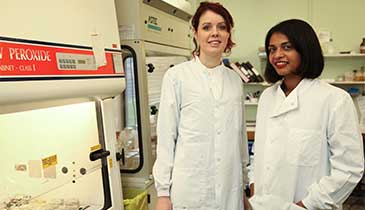Creation of the network was led by brainstrust and supported by a wider group of brain tumour charities including Charlie’s Challenge, Brain Tumour Research and umbrella group Sophie’s Wish.
BRAIN UK, run by the University of Southampton, will link existing archives of brain tumour tissue in a virtual network so that researchers can gain access to unprecedented levels of tissue to support their much needed research into better treatments and a cure for brain cancer.
BRAIN UK is a collaboration between the University of Southampton, Plymouth Hospitals NHS Trust and the University of Bristol together with a network of 26 hospitals across the UK and without their assistance the network wouldn’t be able to operate. Input and support for the project have also been provided by the British Neuropathology Society, British Neuro-oncology Society, Brain Tumour Network, Medical Research Council and National Cancer Research Institute Brain Tumour Clinical Studies Group.
There is a huge unmet scientific and clinical need for brain tumour tissue, and with the medicine agenda growing, the demand for samples with better quality background information grows, making the timing of this project perfect.
Dr Kathreena Kurian, Head of the Brain Tumour Research Group and Senior Clinical Lecturer in the School of Clinical Sciences and a member of the BRAIN UK committee, said: “This project is an excellent opportunity to let the public know how they can support the network and help fight brain tumours.
“By giving consent for tumour tissue removed at operation to be used for research and medical education the public can help researchers combat this devastating disease to benefit future generations of brain tumour patients.”
Brain tumour tissue is currently incredibly difficult for researchers to access, as there are many rare types of tumour. However, a review of current NHS archive holdings, dating back to the 1970s, revealed that a networked approach would make in excess of 400,000 stored samples potentially available to research. The Brain Tumour Archive Network will provide the interface that is needed between researchers and brain tumour tissue stored in NHS hospitals, giving easy access to the right tissue, in sufficiently large numbers with appropriate ethical approval already in place. It will support a diverse range of brain tumour research projects and change the face of neuro-oncology research.
Helen Bulbeck, co-founder and Director of Services at brainstrust, said: “This is an exciting project. The Brain Tumour Archive Network is an initiative where tissue samples provided by patients from across the UK can be accessed through one central resource, then made available to scientists to study how and why brain cancer develops and spreads, and to devise the best possible treatments.”
Sue Farrington Smith of Brain Tumour Research added: “Brain tumours are the biggest cancer killer of children, and more children and young adults die from this disease than from any other cancer; in addition up to 40 per cent of other cancers spread to the brain, yet research into brain tumours remains underfunded and under resourced. For years access to tissue has been the issue for researchers.”
All involved in the project believe that the work will result in more research, better results, and better outcomes for brain tumour patients.
